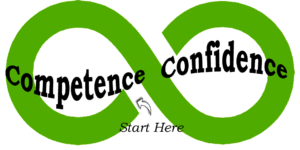
I recently read a report released by the Center for Creative Leadership, The Journey to the Top: Conversations with Successful Singaporean Women. This excellent resource offers tips to both employers and aspiring women, while stressing the importance of having confidence in oneself, and the ability to instill confidence in others. Yet, while we know that confidence is critical for success, strategies for actually building confidence aren’t as readily available.
Over the years I’ve had the privilege of coaching a broad spectrum of clients who struggle with self-confidence. They include accomplished engineers, straight A college students, high-level university administrators, and bold entrepreneurs. While they excel in many areas in life, they’re taunted by subtle fears of not being able to deliver on a new endeavor, of falling short of expectations, and of finally meeting that one daunting challenge they won’t be able to conquer.
Together, we deconstruct confidence to identify attributes that can contribute to a strong foundation upon which a belief in oneself and one’s abilities can be built. We then create plans to cultivate and nurture this foundation. Some of these attributes include curiosity, powerful choices, connections, awe and wonder, and are transferable to different areas of challenge in our lives. They aren’t tied to one set of skills to be mastered.
In my last blog I wrote about the attributes of curiosity, connection and choice as they relate to cultivating confidence. Today, I’ll focus on two additional pillars: purpose and belonging.
It’s commonly agreed that one’s belief in an ability to learn and adapt is at the center of self-confidence. If we believe we can learn new things, overcome obstacles and move towards mastery, we’re much more likely to take on new challenges with greater confidence. However, research now reveals that the conditions that are present when we learn new things, such as our emotional state, relationships to those with whom we’re engaging, and sense of belonging, can profoundly influence our belief system, and therefore impact our confidence level.
Numerous studies show the powerful link between emotions and learning. How we feel impacts our ability to remain attentive, to conquer new material and memorize concepts, to reason, and problem-solve.1 And our feelings in a new learning environment are impacted by our relationship to both what we’re learning and our sense of purpose and belonging.
A child inspired by a video game easily tackles advancing levels of play because of a love for the game. A strong emotional connection to the content is all that’s needed to drive the learning. But when the content of what’s being tackled isn’t an emotional driver, other factors can heighten the emotional connection to fuel the learning process.
A participant in one of my coaching workshops wanted to learn how to snow board but was terrified by the prospect. She didn’t particularly like outdoor sports and the process was daunting. However, there was a strong purpose for her to take on the challenge. Her stepchild was a snowboarding enthusiast, and learning to snowboard her self presented an opportunity for bonding. This purpose gave her the emotional energy she needed to pursue the challenge. Over a few short months she went from a state of no confidence to one of surety as she mastered gliding down Colorado’s Rocky Mountains on a snowboard.
A sense of purpose can be the reason we exist or the reason we do something. It can be rooted in our survival, triggered by a desire to contribute, or connected to altruistic goals such as making the world a better place.
Simon Sinek, the organization consultant and Ted Talk sensation, helps organizations focus attention on why they do what they do. He believes the ‘why’ is what inspires people, what gets employees out of bed in the morning. If organizations know their ‘why’ and are connected to their purpose, they more effectively deliver on ‘what’ they do and ‘how’ they do it.
But how does purpose correlate to self- confidence?

Purpose directs our energy. It supplies us with needed fuel to move past the friction of fear. A sense of purpose also offers two other perspectives:
Purpose pushes us to think outside of ourselves. When we lack confidence we can become myopic. Our insecurities drive us to focus on what we can’t do, where we’re challenged, and what we might lack in a situation. Purpose lifts our focus to something beyond ourselves. Victor Frankel, the holocaust survivor and author of Man’s Search for Meaning, spent much of his mental energy in the concentration camp reconstructing a manuscript that had been destroyed. His purpose was to hold onto his life’s work while enduring horrific atrocities. It sustained him when he had little confidence in life itself.
Purpose gives us hope. It points to what might be possible. It’s a psychic burst of energy that fuels our action when we doubt our abilities. After my father was left a quadriplegic from a car accident, my mother, who was in emotional shock while caring for three young children, needed to go to work. With few career skills and little direction, a wise mentor told her to remember a time when she was happy and full of hope. She recalled her days in school and the joy she experienced when learning. From this reflection, she decided to find work at a university. To secure a job in administration, she needed to be a proficient typist. With little cash on hand, she rented a typewriter and practiced for a week. She then took the test and failed. She tried a second week and failed again. What little confidence she might have had was shattered. But a sense of purpose – providing for her family and returning to a place she once loved dearly – gave her the hope and sustenance to persevere. She rented the typewriter for a third week, practiced diligently and passed the test on the third try, which launched a 30-year fulfilling career.
In addition to purpose, a sense of belonging, when consciously cultivated, can be another foundational pillar for confidence.

Neuroscience research is beginning to capture what happens to the brain when we experience a lack of belonging and social disconnection. It appears that the amygdala, the anterior cingulate cortex and the insula, become activated when we experience social threats, much like we do when we perceive potential for physical harm.2 Being in a constant state of fight or flight can wreak havoc on one’s confidence. At the same time, research offers high correlations between strong social connections with greater physical health and longevity.
Education psychologists are now examining the impact that belonging has on learning. A recent Stanford study studied the impact of social-belonging interventions to support women entering predominately male-dominated fields. The interventions, including affirmation training and integration strategies, led to improved performance and greater confidence for participants3. Because a lack of confidence often plagues us most when we attempt to learn something new, methods for creating social-belonging that can be implemented by both institutions and individuals, can greatly impact overall confidence.
When Google examined how to build the best team through the launch of Project Aristotle, they found similar correlations. With mounds of data at their fingertips, they searched for drivers for high performing teams. They thought the answer might lie in gender mix, experience levels, or a calculated balance of extroverts and introverts. It turns out that empathy, equitable conversation turn-taking, and the ability to have ‘emotional’ conversations are critical drivers for most effective teams. These dynamics require elements of both trust and vulnerability – elements that stem from a strong sense of belonging.
Neither a sense of belonging nor a sense of purpose guarantee confidence, but they provide the fertile ground for growing and riding the curve from not-knowing to knowing. If you or someone with whom you work lacks confidence, take time to reflect on the “why” behind the activity, along with strategies to cultivate connections with others in the environment. Doing this can create optimal conditions for thriving in a state of insecurity as one embarks on new and unfamiliar territory.
1 Tyng, CM. (2017). The Influences of Emotion on Learning and Memory, Front Psychol. 2017; 8: 1454. Published online 2017 Aug 24. doi: 10.3389/fpsyg.2017.01454
2 Eisenberger, MI & Cole SW. (2012). Social neuroscience and health: neurophysiological mechanisms linking social ties with physical health. Nat Neurosci. 2012 Apr 15;15(5):669-74. doi: 10.1038/nn.3086.
3 Walton, Gregory & Logel, Christine & Peach, Jennifer & J. Spencer, Steven & P. Zanna, Mark. (2014). Two Brief Interventions to Mitigate a “Chilly Climate” Transform Women’s Experience, Relationships, and Achievement in Engineering. Journal of Educational Psychology. 107. 10.1037/a0037461.

 As a result, the equation confidence = competence has taken root. By developing competencies and mastering skills, confidence and improved self-esteem should follow.
As a result, the equation confidence = competence has taken root. By developing competencies and mastering skills, confidence and improved self-esteem should follow. Think about a time you were curious about something. What feelings or reactions did you experience in this curiosity state? Was it a sense of wonder? A desire to learn more? A nudge to look more closely?
Think about a time you were curious about something. What feelings or reactions did you experience in this curiosity state? Was it a sense of wonder? A desire to learn more? A nudge to look more closely?



